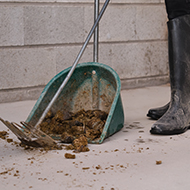Calls for both the public and the Government to take action.
This year’s Bees’ Needs Week has launched with a call from the UK Government for everyone to take ‘simple steps’ to help boost the number of pollinators.
Although bees and other species are crucial to the environment and food production, populations continue to be threatened by factors including habitat loss, climate change, and the use of harmful pesticides.
To mark the annual event, which this year runs from 10-16 July, the Government’s Department for Environment, Food and Rural Affairs (Defra) has set out five steps which people can follow to protect pollinators:
- Grow more flowers, shrubs and trees
- Let your garden grow wild
- Cut your grass less often
- Don’t disturb insect nest and hibernation spots
- Think carefully about whether to use pesticides.
Members of the public are also being encouraged to become citizen scientists and carry out ‘Flower-Insect Timed Counts’. Participants are asked to spend 10 minutes watching flowers in good weather and count how many pollinators they see.
The data will be used by the Pollinator Monitoring Scheme to measure trends in UK pollinator populations and target conservations efforts.
Environment minister Trudy Harrison said: “We simply wouldn’t be able to live without pollinators. These marvellous insects have a unique ability to move pollen between plants which sustains whole ecosystems and creates a resilient food supply for wildlife and people.
“Everyone can do their part – whether it’s taking part in a count, allowing your garden to grow more wild, or planting more flowers. The actions we take in Bees’ Needs Week and beyond will help give nature a boost and create a better future for all.”
With the threat to pollinators so severe, there are calls for the Government itself to do more to help ensure their long-term survival.
Joe Llanos, public affairs officer at the Wildlife Trusts, said: “To protect bees, it is essential that the UK Government starts taking the threats to their populations seriously. This includes prioritising the restoration of the natural habitats that bees rely on, and working towards protecting 30 per cent of land for nature by 2030.
“They also need to take meaningful action to reduce pesticide use and put an end to the emergency authorisation of neonicotinoid pesticides, which were banned in 2018 due to their devastating toxicity to bees. Unfortunately, since this ban the Government have repeatedly decided to allow the use of these toxic substances, with the latest authorisation being granted earlier this year. If Defra truly care about bees’ needs, they should commit to ending the authorisations of banned neonics once and for all.”






 Birmingham Dogs Home has issued an urgent winter appeal as it faces more challenges over the Christmas period.
Birmingham Dogs Home has issued an urgent winter appeal as it faces more challenges over the Christmas period.
